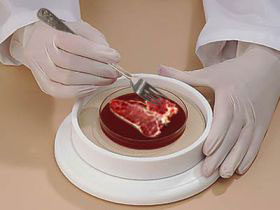Cultivate cattle meat
Lab meat in the laboratory is opening a new era for agriculture worldwide.
In just 10 years, people can freely eat cattle without fear of contagious diseases or encounter contaminated meat. Not only that, people are also able to escape the ' killing ' and the earth environment is also better protected. It sounds like a fiction, but the team of experts is pioneering the field of asserting laboratory animal meat: Their innovation can change the global diet within 1 more decade.
Benefits of transplanted meat

Lab animal meat will be available in the world market in the next 10 years (Photo: Ziua)
CNN scientist quoted Jason Matheny of New Harvest research group as saying that artificial meat has many advantages. ' We can precisely control the amount of fat in the meat. We can create beef with an ideal fatty acid ratio , "Matheny said.
Meat and livestock production technology is now one of the sources of many human diseases, such as bird flu, mad cow disease, salmonella infection. Scientists reassure that their inoculated meat products are created in an immaculate environment, the condition that ranches or slaughterhouses never get.
The process of ordinary meat production also creates an environmental burden. The impact of the livestock industry on global climate change has been highlighted in a recent UN report. Organizations like Greenpeace and Friends of the Earth have demonstrated that soybean fields for livestock farming have contributed to the destruction of the Amazon forest. In addition, the initial research results of the University of Oxford (UK) show that cattle meat transplantation will reduce more than 80% of carbon emissions compared to the normal meat production cycle.
Huge profits
So how to produce artificial cattle? Mr. Jason Matheny's team said the inoculated meat would be made from samples of animals that were slaughtered in the usual way. For example, ' pork ' is made from the ovaries of sows that have been fertilized with pig sperm in the slaughterhouse, then turn the eggs into an embryo. At that time, scientists will place them in the environment full of nutrients necessary for growth and development.
In addition to the practical benefits for human health and the environment, the main driving force behind the study of inoculated meat is the terrible profit of the cattle meat industry. According to New Harvest statistics, global meat markets are estimated to generate $ 1,000 billion in revenue a year, and this demand is expected to double by 2050. Matheny researcher also said the first group financial investment Kleiner Perkins Caufield & Buyers (USA) expressed interest in his scientific project, while Stegman - the company that provides sausages for Sara Lee food group - is now a partner of New Harvest. The Dutch government has also invested about $ 4 million in research on artificial cattle.
It seems that what's left to make scientists worry is the reaction of consumers. Would they agree to exchange a piece of meat from a cow raised in a normal way to get the ' Frankenstein food ' line?
- Australia: Superfoods increase the quality of cattle meat
- Meat is the driving force of evolution
- Producing artificial meat from ... stem cells
- American cattle lose their ears mass
- Anti-cold measures for cattle
- Produce meat without slaughtering cattle
- Clenbuterol contaminated meat detection kit
- Strange virus attacks cattle in Quang Nam border
- What do you know about 'vegetarian' meat?
- Meat, fish 'suck' chemicals: how harmful?
- 6 mistakes when cooking meat makes you pick up the disease
- 10 mistakes everyone makes when cooking meat
 Why do potatoes have eyes?
Why do potatoes have eyes? 'Tragedy' the world's largest carnivorous life: Death becomes ... public toilet
'Tragedy' the world's largest carnivorous life: Death becomes ... public toilet Tomatoes were once considered 'poisonous' for 200 years
Tomatoes were once considered 'poisonous' for 200 years Detecting microscopic parasites on human face
Detecting microscopic parasites on human face